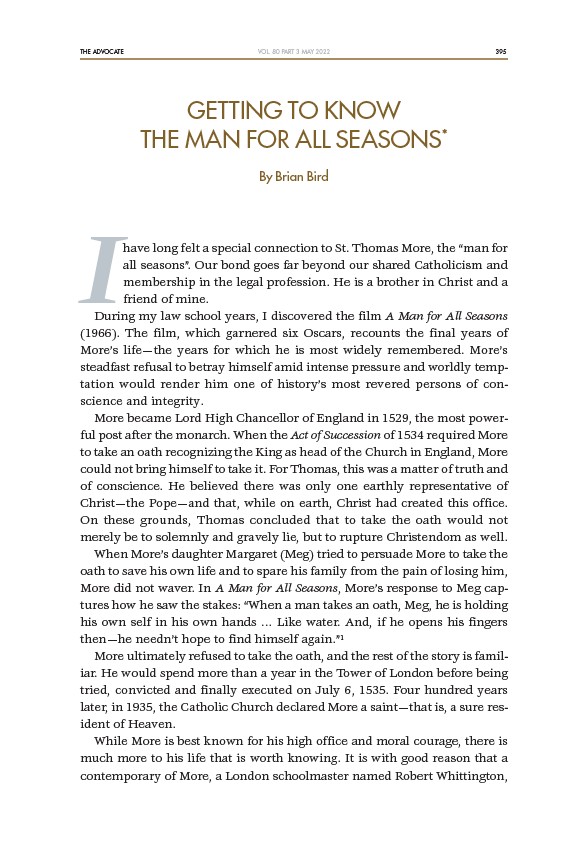
THE ADVOCATE 395
VOL. 80 PART 3 MAY 2022
GETTING TO KNOW
THE MAN FOR ALL SEASONS*
By Brian Bird
I have long felt a special connection to St. Thomas More, the “man for
all seasons”. Our bond goes far beyond our shared Catholicism and
membership in the legal profession. He is a brother in Christ and a
friend of mine.
During my law school years, I discovered the film A Man for All Seasons
(1966). The film, which garnered six Oscars, recounts the final years of
More’s life—the years for which he is most widely remembered. More’s
steadfast refusal to betray himself amid intense pressure and worldly temptation
would render him one of history’s most revered persons of conscience
and integrity.
More became Lord High Chancellor of England in 1529, the most powerful
post after the monarch. When the Act of Succession of 1534 required More
to take an oath recognizing the King as head of the Church in England, More
could not bring himself to take it. For Thomas, this was a matter of truth and
of conscience. He believed there was only one earthly representative of
Christ—the Pope—and that, while on earth, Christ had created this office.
On these grounds, Thomas concluded that to take the oath would not
merely be to solemnly and gravely lie, but to rupture Christendom as well.
When More’s daughter Margaret (Meg) tried to persuade More to take the
oath to save his own life and to spare his family from the pain of losing him,
More did not waver. In A Man for All Seasons, More’s response to Meg captures
how he saw the stakes: “When a man takes an oath, Meg, he is holding
his own self in his own hands … Like water. And, if he opens his fingers
then—he needn’t hope to find himself again.”1
More ultimately refused to take the oath, and the rest of the story is familiar.
He would spend more than a year in the Tower of London before being
tried, convicted and finally executed on July 6, 1535. Four hundred years
later, in 1935, the Catholic Church declared More a saint—that is, a sure resident
of Heaven.
While More is best known for his high office and moral courage, there is
much more to his life that is worth knowing. It is with good reason that a
contemporary of More, a London schoolmaster named Robert Whittington,